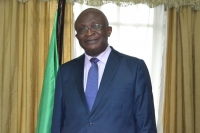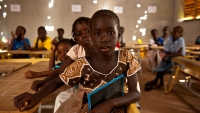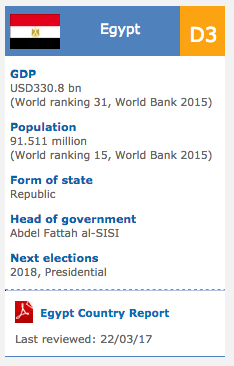Sierra Leone: A Conversation With - Port Loko District's Mohamed Alusine Kabia
2015/08/19

Sierra Leone's Port Loko district hasn't had a case of Ebola for 26 days. But in an effort to boost morale and keep food insecurity at bay, one community group has distributed food and care packages to hundreds of non-quarantined homes. Cinnatus Dumbaya met Mohamed Alusine Kabia of the Port Loko District Indigenes, in the village of Mamusa.
Tell us about this initiative, Mohamed.
Kabia: This was our second intervention in this area to provide food and non-food items for both quarantined and non-quarantined homes. Mamusa was the last quarantined chiefdom in our district, released from quarantine on August 13. We all needed to focus on Mamusa to ensure that it ends here.
We know it's crucial to provide food to quarantined homes, but why did you decide to provide food to non-quarantined homes?
Kabia: We think this was highly necessary and appropriate. Based on our observations during our visitations in the communities, non-quarantined people as well needed this food. People in non-quarantined homes are equally deprived as those in quarantined homes. Their normal livelihoods have stopped as a result of Ebola. And one thing you need to know is that most of these houses are interrelated. These people are all family. You have the breadwinner in one home that may be looking over the next houses surrounding him. So tell me what happens at the same time as you put that breadwinner in quarantine? What will happen to the other non-quarantined households?
This is why we thought they all needed the food. We had cases of some of these people in the communities risking their lives to cross over to quarantined homes where they have friends and relatives to find food. So we thought the best way to holistically solve the problem, particularly for a small community like this, was to provide food for all in the village - so no one will risk crossing over to quarantined homes to find food. These are their families and friends. And they have seen that a lot of supply is going to the quarantined homes and they don't have anything.
Have there been any documented cases of people sneaking into quarantined homes to take food?
Kabia: The question we should be pondering is, what could be the intention behind taking such a risk? It's simple: other people as well want to benefit from the supply. Next we decided to give them the food some of them confessed that they would not have had any choice but to beg for food from the quarantined homes. We have seen a situation where a family volunteered itself to be quarantined, just because they as well wanted to benefit from the food supplies that come into quarantined homes. Poverty is the baseline for all of this.
Did you distribute non-food items?
Kabia: We as well wanted to provide support to pregnant women in the community. They have become additional vulnerable during these times. And as you may know, a lot of factors are responsible for this. They lack a lot of things, ranging from medicine to clothes and other basic things that a pregnant woman should have. The only nurse in Mamusa has just been released from quarantine. She was quarantined next she helped to deliver a pregnant woman who later tested Ebola positive. In fact, the genesis of the whole of Mamusa's quarantining started with this pregnant woman who ran away from an extra village and came over to her relatives in Mamusa.
Some pregnant women have told us that they didn't like going to the hospital because - according to them - it's embarrassing that they could not afford the luxury of buying nice baby clothes to show off at the hospital. In response to all these challenges, we bought them medical packages and we have a trained medical nurse that shows them how to use prescriptions. For pregnant women who are about to go into labour, we have bought baby clothes, wrappers, cosmetics and all the basic domestic things they would need. We are doing this primarily to encourage them to go to the hospital to deliver.
What motivates you in this work?
Kabia: My brother, our major motivation is the desire to end the sufferings of our people in the district and the country as a whole. The whole country has pointed fingers at us that we are holding the country to ransom.
We have been labelled as lawless and not taking the fight against Ebola seriously. And you know, those are very critical charges. So as indigenes, we came together and said to ourselves that enough is enough. We will presently move back into our district and into the communities to work together to end Ebola for good.
We're as well promoting a community watch program. We recruit surveillance officers from different communities in the district, particularly in places that were once Ebola hotspots. These surveillance officers are equipped with mobile phones to call us in case of emergencies in their communities. They call if someone falls ill or starts showing any of the known symptoms of Ebola. We even give incentives to them for any alert they give that leads to a positive case.
Port Loko has gone 26 days without any cases of Ebola. What presently?
Kabia: Our next plan is to remain at zero. We are happy that we have got to this point but we will not be complacent. We have done far better than this before but we got a return of Ebola again. We don't want to see that anymore. We have decided to fully engage okada (motorbike) drivers in the campaign to maintain zero cases. They have been notorious for transporting sick people from one place to an extra. Presently, we want them to take ownership. That is why we are engaging them to be surveillance officers all over the district. They should monitor the communities and statement to us.
Lots of groups would like to set up a similar scheme, but lack resources. How is your work funded?
Kabia: We rely 100 % on personal contributions from members of our group. We have members both at home and abroad that give money. The rationale really is to complement the government and other agencies' effort to end Ebola. We realize that the government alone cannot finish Ebola without the support of us, the community.
- Related Articles

Africa's Relationship With China Is Ancient History
2017/07/02 In 2002 South Africa's Parliament unveiled a digital reproduction of a map - of China, the Middle East and Africa - that some speculated could be the initial map of the African continent. The Da Ming Hun Yi Tu - the Comprehensive Map of the Great Ming Empire - was drawn up around 1389 during the Ming Dynasty, according to historian Hyunhee Park.
Africa: Making Things Happen at the Bank - 'Not a Talk Shop' - Akin Adesina
2017/07/02 Dr. Akinwumi Adesina is focusing on five areas to achieve the African and world goals for a prosperous continent since becoming president of the African Development Bank - Africa's major public financial institution in September 2015. He was a keynote speaker at this month's Corporate Council on Africa's U.S.- Africa Business Summit in Washington D.C. and moderated a lively panel with five African government ministers. He as well received the Gene White Lifetime Succcess Award from the World Child Nutrition Foundation. This week, he was named the 2017 recipient of the World Food Prize, a prestigious honor that includes a $250,000 award. In an interview in Washington, DC, Adesina discussed the Development Bank's ambitious schedule and his vision for attracting the increase capital Africa needs. Posting questions for AllAfrica was Noluthando Crockett-Ntonga.
Climate change laws around the world
2017/05/14 There has been a 20-fold increase in the number of global climate change laws since 1997, according to the most comprehensive database of relevant policy and legislation. The database, produced by the Grantham Research Institute on Climate Change and the Environment and the Sabin Center on Climate Change Law, includes more than 1,200 relevant policies across 164 countries, which account for 95% of global greenhouse gas emissions.
Finance & Economy Where’s best to invest in Sierra Leone?
2016/12/25 Eager to attract foreign investors and ensure their projects are a success, Sierra Leone has been strengthening macroeconomic situation, investment environment and foreign relations, particularly with China and the UK, to open up the wide scope of opportunities its holds beyond its mining sector to partners overseas. Minister of Finance and Economic Development Momodu L. Kargbo takes a look at the best areas for investment, the 2017 Budget’s target areas for accelerated growth, and the country’s ability to honor its credit obligations.
Education Quality: Measuring Learning Outcomes in Francophone Africa’s Primary Schools
2016/05/28 Over the last 15 years, West African governments and the international community have been successful at expanding access to primary schooling and from presently on, a ground-breaking regional learning assessment has revealed that the quality of education has remained elusive. The majority of children surveyed were not acquiring the basic literacy and math skills that are crucial for building human capital in the region.
- Sierra Leone News
-
- AFGHANISTAN: UNWTO: International tourism – strongest half-year results since 2010
- BOTSWANA: Why governments need to support the financial sector to meet the unserved needs of smallholder farmers
- BOTSWANA: International Arrivals To Africa Reach More Than 18 Million In 2017
- BOTSWANA: Africa: USA-Africa - No Policy? Bad Policy? or Both?
- BOTSWANA: Africa: U.S. State Department To Get Experienced Diplomat in Key Africa Post
- BOTSWANA: Africa’s economic growth in 2016 was driven by East Africa
- Trending Articles
-
- SOUTH AFRICA: Nigeria and South Africa emerge from recession
- BAHRAIN: Bahrain issues new rules to encourage fintech growth
- ARUBA: Director of Tourism Turks and Caicos after Irma: Tourism, visitors, hotels current status
- ANGOLA: Angola: Elections / 2017 - Provisional Data Point Out Qualified Majority for MPLA
- WORLD: How fair is our food? Big companies take reins on sourcing schemes
- CHINA: Russian firm seals energy exploration deal to drill South African shelf




.gif?1356023993)






